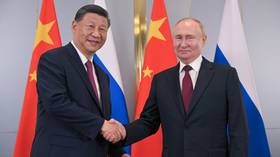India and China vow to stabilize bilateral ties
New Delhi and Beijing have resolved to improve relations amid an ongoing border dispute
The foreign ministers of India and China have spoken in favor of stabilizing ties at a meeting of the Association of Southeast Asian Nations (ASEAN) in Laos.
“It is hoped that China and India will work in the same direction and explore how the neighbouring countries can get along,” Chinese Foreign Minister Wang Yi said after speaking with his Indian counterpart Subrahmanyam Jaishankar on Thursday.
Wang said China-India relations have an important impact beyond just the two nations, according to a statement released by the Chinese Foreign Ministry. “It is in the interests of both sides to get China-India relations back on track,” he stressed.
Earlier this month, the two diplomats met at the Shanghai Cooperation Organization (SCO) summit in Astana, Kazakhstan, where they agreed to “redouble efforts through diplomatic and military channels” to find an “early resolution” to long-standing border disputes.
Ties between the two powerful neighbors soured in 2020, when troops clashed in the disputed Galwan Valley, resulting in casualties on both sides. Since then, there have been over a dozen of rounds of talks aimed at resolving the dispute.
According to Jaishankar’s remarks after the latest meeting, posted on X (formerly Twitter), stabilizing ties is in the “mutual interest” of the two nations and they should approach the “immediate issues” with a sense of “purpose and urgency.”
He clarified, however, that while the countries agreed to give “strong guidance” to the disengagement process in the disputed eastern Ladakh region, full respect for the Line of Actual Control (LAC) and past agreements needs to be ensured.
Jaishankar also stated that ties between India and China hold “an exceptional significance” as they are the two most populous nations and among the five largest economies globally. “Our ability to ensure that [ties] are stable and forward looking is essential both for the prospects of Asia and that of the multipolar world,” he noted.
Shortly after Indian Prime Minister Narendra Modi was elected for a third consecutive term this year, Jaishankar insisted that New Delhi would focus on finding solutions to its border disputes with China and Pakistan. Modi himself also said that New Delhi and Beijing had to “urgently address” their border disputes and resolve the “abnormality” in their bilateral ties.
Despite continuing friction, China emerged as India’s top trading partner in the last fiscal year, with two-way trade reaching $118.4 billion. Meanwhile, Beijing has also expressed a willingness to work with India to improve ties. In May, Xu Feihong arrived in Delhi to assume office as the 17th ambassador to India after 18 months without a Chinese envoy.
Where India Meets Russia: Follow and share RT India on X and Instagram
You can share this story on social media:








Comments are closed.